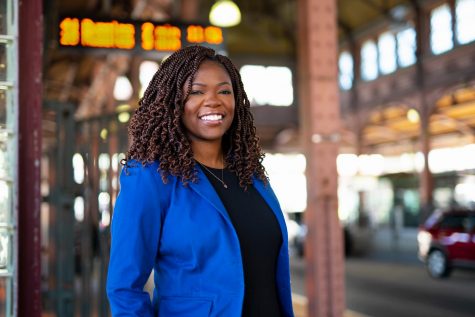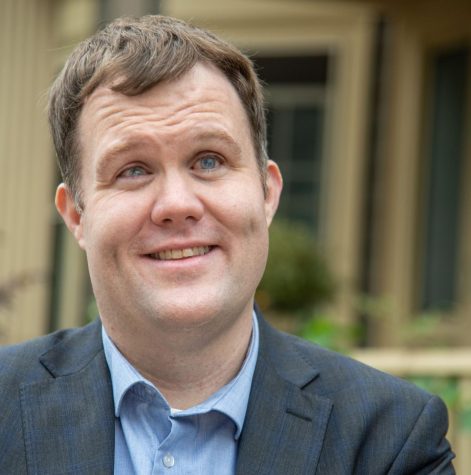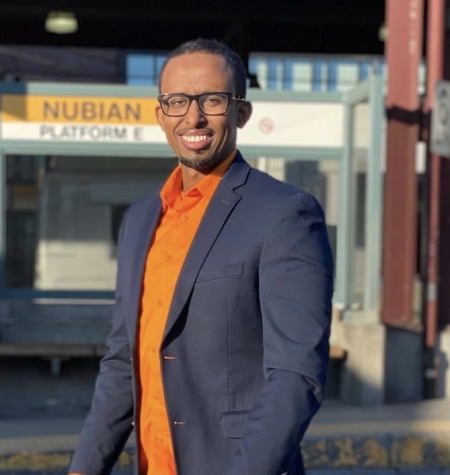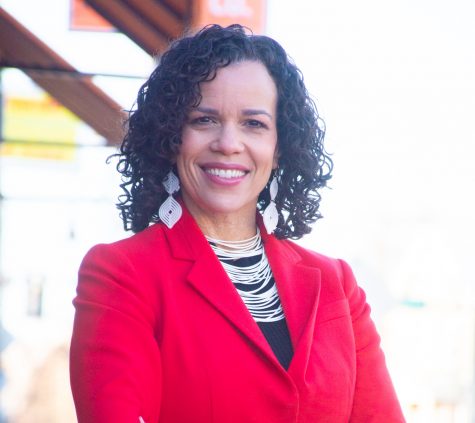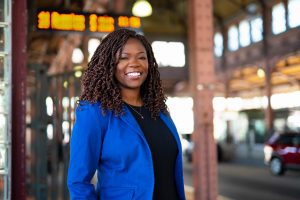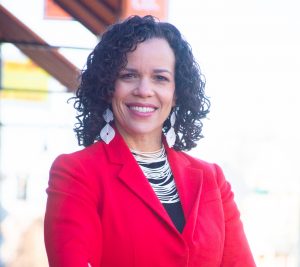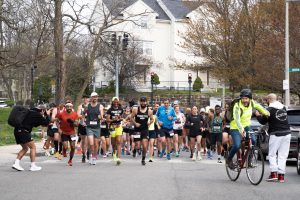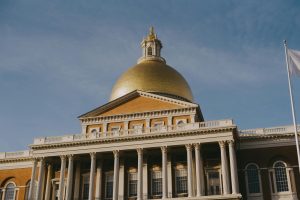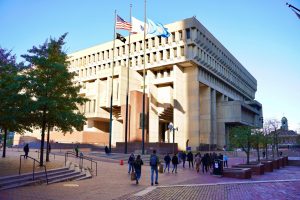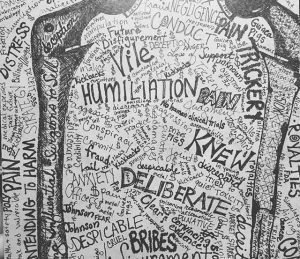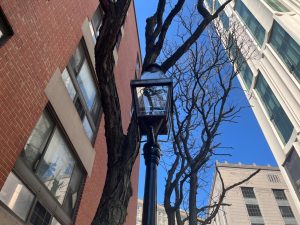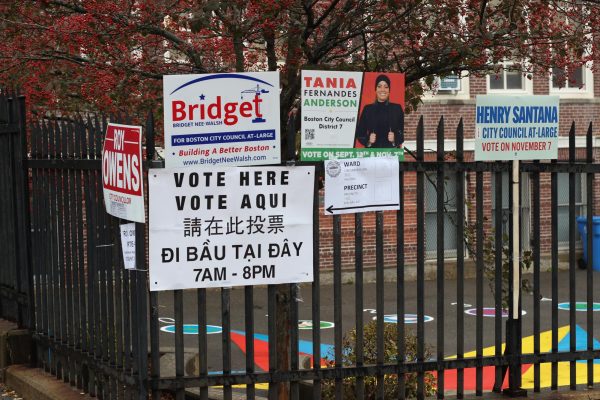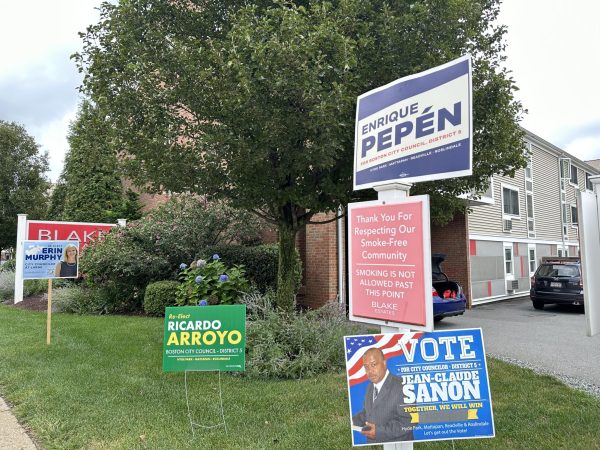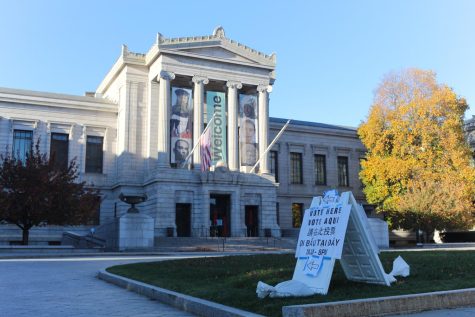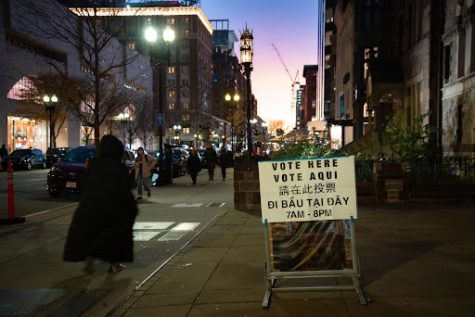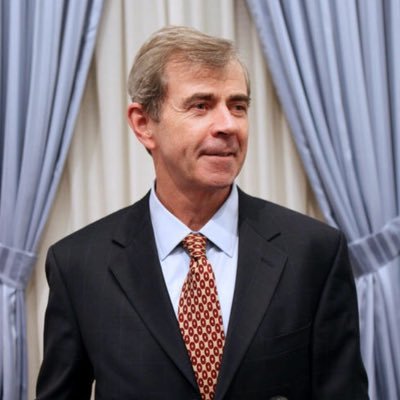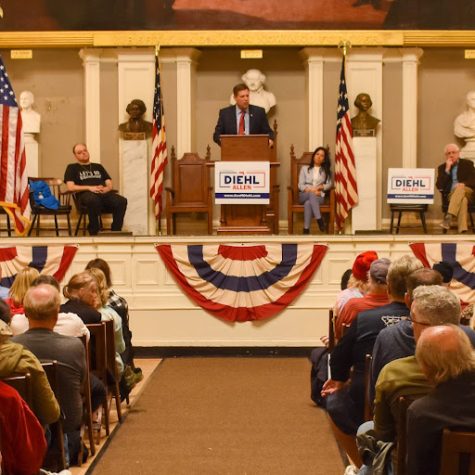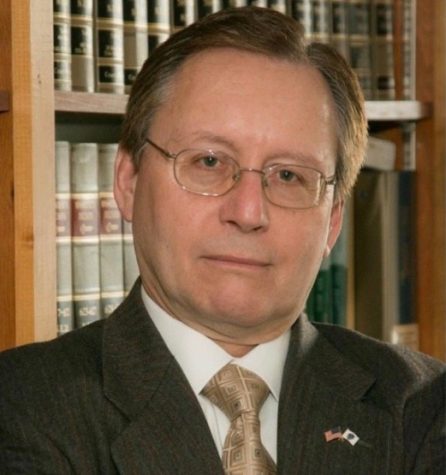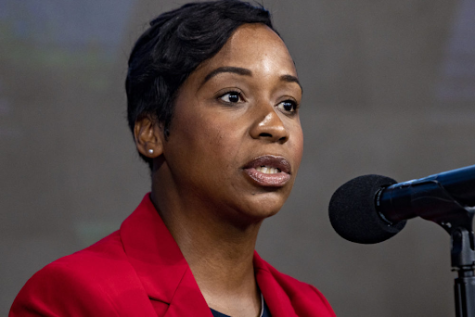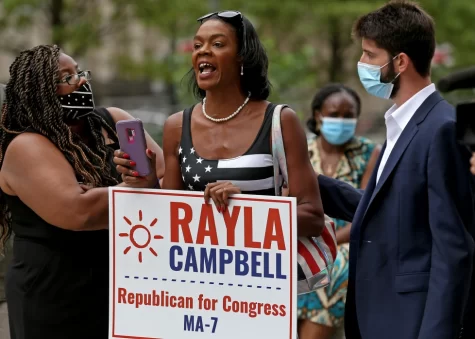City council race: Trevour Smith running for District 4
April 20, 2021
Trevour Smith, a Boston Public Schools teacher, is running to be District 4 city councilor, representing the neighborhoods of Dorchester and Mattapan, as well as parts of Roslindale and Jamaica Plain.
Smith holds an MBA from Campbell University and previously worked in banking before leaving the industry for a more fulfilling job as an educator.
Smith is running against at least 10 candidates including Jacob Urena, Joel Richards, Deeqo Jibril, Nikkia Jean-Charles, Brian Worrell, William Dickerson, Leonard Lee, Troy Smith, Trina Ruffin and Josette Williams for the District 4 seat. The incumbent, Andrea Campbell, is running for Boston mayor.
A math teacher at Boston Latin School, Smith said he wants to apply the same philosophy that enables him to build trust and a strong relationship with his students to secure the votes of Boston residents.
“Leadership is not about being in charge,” he said. “Leadership is about taking care of those in your charge, and it’s a responsibility to make sure that you take care of the person to your left, you take care of the person to your right. And when you’re able to do those things, people feel [like they are] in a trusting environment.”
Smith said his campaign’s priorities are education and transportation, specifically trying to get a student elected to the school committee and ensuring a more equitable education in public schools. These key issues, he said, are inspired by his conversations with students and parents.
“In my district, I don’t think we have a single Title I school, and then it also takes students two and a half hours just to get to Latin School at times,” he said. “They [have] got to get up at 5 a.m. and if they miss a certain bus, then they’re late to school … and then it just spirals down and that negatively affects Black and brown students.”
The Scope spoke with Smith to discuss his campaign’s top issues and his plans to address them if elected. The following conversation has been edited for length and clarity.
Why did you decide to run for office?
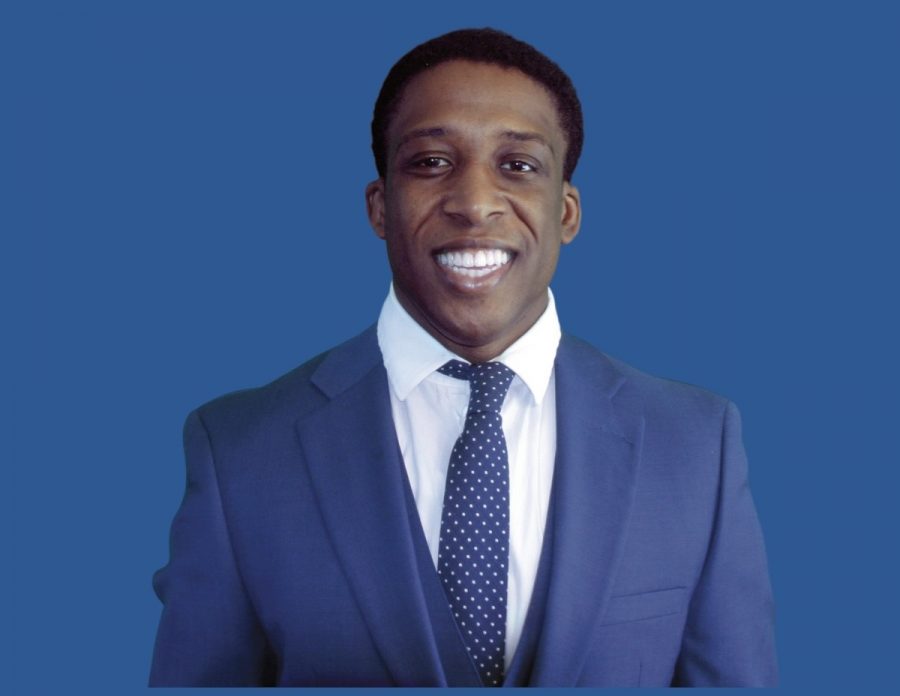
What made me decide to run was a multitude of things. Last year, I lost my grandfather to COVID, and that was very disheartening for myself and for my family. The only thing that I could think about was diving myself into work and helping other families.
And so I started getting involved in organizing with the Boston Teachers Union (BTU) and started reaching out and started talking and listening to families or my colleagues, hearing their fears, hearing their worries, hearing what they’re concerned about.
Then the school year started, and I was going through that whole process of being a member organizer working with the BTU, I really got a good glimpse about how to organize. Then, Andrea Campbell came to our school talked to the students that are Black or minority students and she announced that she was running for the mayoral race.
I was like, ‘I live in District 4. Andrea Campbell is leaving. Why not run? Why not take it on and do this and try to do more for the families in my district.’
Being an educator, I can inspire every day; I can teach every day; I can bring the best education to my students, but going through that process and listening to the hardships of families, listening to the miscommunications between the system and the families, we as educators were like, ‘This can’t happen for the district… Something has to change.”
I really just want to bring some changes to the city council, as an educator, I hear the problems for many of our families that happen every day, how students can’t get the transport to get to school in time, how their school lunches are terrible and they have nothing to eat and it really affects their education, their learning.
In my district, I don’t think we have a single Title I school, and then it also takes students two and a half hours just to get to [Boston] Latin School at times. They [have] got to get up at 5 a.m. and if they miss a certain bus, then they’re late to school … and then it just spirals down and that negatively affects Black and brown students, and Black and brown students are the main ones that live in my District.
And so I want to change that narrative. I want to be on the Education Committee, I want to be on the Transportation Committee because I want to try to solve those problems that are going on. Looking at what just happened this summer with the Michael Loconto situation on the school committee right?
[Editor’s note: Former Boston School Committee Chairman Michael Loconto resigned last year after he appeared to mock Asian names of people who signed up to speak during a virtual meeting about exam school admissions].
We need a school committee that has at least one elected official and at least a student voice. Student voice is very important. They are the ones that experience the teaching. We need someone elected onto a committee so that people in the family feel like they have a voice at least. If the mayor wants to appoint some people to the school committee, let’s have that, but let’s also at least have some checks and balances against that, to at least have a student voice, at least have an elected official that the people have chosen, and who is going to speak for the people.
Parents are giving their most precious item in my hands every single day. They trust me with the most precious thing that they have in their lives and so I take that as an honor and I also am very, very grateful for that. And so, I think and I believe that’s another reason why I’m running. I want to build a future that looks a lot different than what we are in right now. I know it will take some time, but being a Black male educator, [with] everything that’s going on with the news, if I have a son, if I have a daughter, I want the world to look a little bit different, and I want us to start progressing towards that way.
Those are the main reasons why I want to run.
What are the key issues on your platform?
I have a whole platform of things I call it the S.M.I.T.H method [which stands for Schools & Education – Money, Finances, Banking – Income Equality and Employment – Tenants Rights and Transportation – Housing and Ownership].
My key issues are I’m trying to stick to things that I’ve been deeply involved in and used to: education, I think, is going to be my number one [issue], really trying to get school committee elected, and trying to get a student voice on there and working on that committee to really boost schools within our district and look at how we can adjust and make equitable education in Boston.
Secondly, transportation. I’ve listened on the Blue Hills project as that has been coming, I’ve been to many of those listening sessions, hearing what that’s going to look like for the whole Blue Hills. They’re looking to tear the whole thing out and put some bus lanes in the middle of it. These are things I have to tell our constituents. Many people don’t know about this. They’re going to rip out the whole median and put a bus lane and bike path…And so that project brings with it a lot of jobs. It may slow some traffic down but it is going to bring some more jobs to the area for people to get to, which is necessary for our district as well.
I think those would be my two crucial things that I would really want to focus on.
With education and transportation being your priorities, do you have specific plans for how you want to achieve the goals you set out?
I think it’s going to be a collaborative effort, and just like with anything we’re going to, we’re definitely going to need to work in teams, with other council members in order to get everything done. I hope [the city council] gets a little bit more power over our budget reconciliation, which will be changing soon with the city council. The city council would not just going to be listening and voting on the mayor’s budget and reducing it but at least have some say into how those funds can be appropriated and how they can be used to help after-school programs, how they can help pay more teachers.
That’ll be talks that we probably have to talk with the BTU and the school committee and…just really hammering out how we can equitably use these funds for the betterment, not just for those students, for the people in my district, but for Boston.
[Editor’s note: In December last year, the Boston City Council voted in favor of a ballot measure that would ask the voters in the city if they want to give the council more sway over taxpayer dollars, namely, the council would have the ability to amend the mayor’s proposed budget, but not increase its total amount].
How has your experience prepared you for the job?
I have taught at Boston Latin School for the last five years now. But before I got to Boston, I taught at one of the lowest-performing high school districts in the state. I taught at Lawrence Public High. Before I even got into teaching, I got my MBA, and I used to work for the U.S. Trust Wealth Management and worked for some banks. That realm was not really fulfilling for me, I really found it hard to just really help. And so that’s why I came to teaching working at Lawrence Public High School when it was in receivership.
I really appreciated my time there at Lawrence Public High. It went from a Title I, in receivership to Level II school, and now I think it has gone back because we have to understand that teachers, the boots on the ground, are the people that really push those things. Now, leadership is great, but we are the ones that really put our feet to the fire and really go out there and make those changes happen. And so you have to make sure that you are retaining good employees, and at that time we just felt that we were undervalued.
So I contribute everything that I am and how I teach to that time with those teachers, really collaborating and really thinking about how can we teach the whole child, how we make sure that we’re reaching out to families, and really [become] catalysts for change in this educational space. And so when I got to Boston Latin School, and I love telling the story, when I came to Boston Latin School, BlackatBLS happened and this whole racial dynamic about how we’re supposed to incorporate this in our teaching and look at our own biases and look at our own selves as we’re teaching and recognize these things.
Again, I feel like I’ve been a catalyst for change here at Boston Latin School, getting involved with the Equity Committee, getting involved with my colleagues to really change the culture here at Boston Latin School because of that event and events from in the past…It gives me great hope to see, when you have a close-knit team and you have people all working for the same common goal, what can really happen and the students can see it every day.
That’s what I want to try to bring to the city council. I believe all of those experiences will allow me to build trusting teams. Leadership is not about being in charge. Leadership is about taking care of those in your charge, and it’s a responsibility to make sure that you take care of the person to your left, you take care of the person to your right. And when you’re able to do those things, people feel [like they are] in a trusting environment.
I just want to continue to make as big of an impact as I can, with all of those people that I meet. The smallest things can have the biggest impacts.
What do you like about District 4 and what do you think can be changed?
I like the people in my district. It’s a very immigrant district, a lot of Haitian Creole, Haitian Trinidadian, and Jamaican. And I think that’s what I appreciate most is that we have a very eclectic type of foods that I can have and taste at different times. Diversity…creates so much growth. Once you have different voices, it just creates so much good growth, that if you just stay homogeneous, you’re gonna stay stagnant. Also, [I love] the parks and trails in my district, which I really love to go on.
The things that I want to change. We can definitely do better with businesses. I want to attract businesses to the neighborhood, and to the district… I’ll just be frank, there’s a reason why we don’t get outside people that want to come to our district. So everyone that lives there knows it has been there forever. But…I haven’t heard many people that live in Jamaica Plain or that live in West Roxbury [say] like, ‘Oh yeah, I’m gonna go to Dorchester for this. I’m gonna go to Mattapan for that.’
So, we have to continue…to make it attractive enough so that the new person to Boston — because Boston encompasses all these neighborhoods, right? — I don’t want the narrative to be like, ‘Oh, don’t go to Dorchester because of this or that.’ We want to make it so that every district is offering something to any person.
And so those are the things that I want to change and I really just want to create a more vibrant community where, as I talked about, that people, everyone was looking out for the person to the left and looking out for the person to the right, and really lifting each other up…keep bringing in some attractive businesses, because each of those each neighborhood has its thing.
[We] just have to find what our thing is right and what we can really bring in and I think it’s the people, and it’s the cultures, and it’s the [athleticism], there’s a tennis community that’s been there, and a well-established tennis center. We have the Boys and Girls Club,…Harambee Park, which is going to be revitalized, which can bring sports like football and soccer and really bring this communal effect to the District. So those are some things that I want to change there.
Is there anything that you wanted to share that I didn’t ask?
I’m very grateful for this opportunity. I hope when I get into city council that I can really make a difference [with] the things that I talked about. I just want to continue to be the leader that I’m growing up to be. Leadership is not about expertise, it’s all about learning and it’s been getting better each and every day.
I’ve learned that you don’t have to be the smartest person in the room all the time. Sometimes what helps to ask, to be an idiot and to ask the question that may be on everyone’s mind. I used to be like that in school, everyone has the same question but will [just] sit, and then I’ll be like, ‘What does this mean?’ And then everyone starts nodding their head like ‘I didn’t know what that meant either.’
I’m not afraid to ask those questions, and to be that person because we all don’t know everything and I thought that would be hard for us to know everything. But to be a leader, you got to be courageous, you got to be the first person to walk into the fire, you got to be the first one to go out there and I’m not afraid to do any of those things. Take the first step. Take the first bullet because I know that I’m taking care of the person to the left, taking care of the person to the right of me and that’s the best that I can do.


